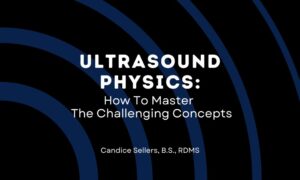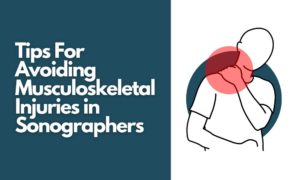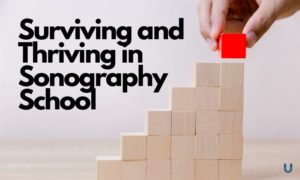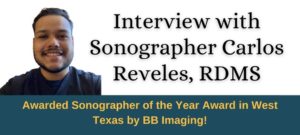In Part 1 of our interview with diagnostic medical sonographer, echocardiographer and vascular technologist, Tom Whelan (RDMS, RDCS, RVT, FASE), we learned how he started his sonography career over three decades ago and how he has been a pioneer in the field. In this second part, he shares some of his professional highlights as well as valuable advice for those considering a career in ultrasound.
Once a Teacher, Always a Teacher
TW: Then I got a call from a school in Houston—the Advanced Health Education Center. I ended up working for them up until last year as a full time instructor. That’s where I really, really enjoyed life. If you ask me what’s more important, patient care or teaching students the correct way to do an ultrasound, it would be a toss-up for me because both are equally important.
The good thing about the teaching is it wasn’t just here in Houston, Texas. I got to go to places that people dream of going. I got to go to Cairo, Egypt a couple weeks before the uprising; I got to see the pyramids and meet some nice people there. I’ve been to Kuwait to teach. I’ve been to China twice. I’ve been to Hong Kong to teach—they speak English there by the way. I’ve been to Guatemala to actually teach doctors and nurses how to use basic ultrasound to take care of their very poor, indigenous population of Maya Indians.
Late last year, I got to travel on behalf of the Defense Department and the National Institute of Health to Maryland and work in a Level IV biohazard lab. The Defense Department runs Level IV biohazard labs that try to invent vaccines for bioterrorism agents. So their job is to invent vaccines that could potentially protect us. I got to travel up there and educate these veterinarians in the Level IV labs on how to do ultrasounds on non-human primates (monkeys). That was probably one of the highlights of my career. I had to dress up in a moon suit because you’re around these really nasty bugs. You had to have CIA and FBI clearance because it’s secret work, so it was really cool!
Tom’s advice to students
To prospective students, take a good hard look at ultrasound. It’s not going away. It’s going to be a profession that just increases. It’s a very rewarding profession. It’s also very technical, there is a steep learning curve to it and it takes lifetime dedication. You’re never going to know everything about ultrasound because it’s constantly changing. Every time you turn around, somebody invents a new procedure that’s saving people’s lives. You have to continue educating yourself. In my humble opinion it would be a wise choice for any person thinking about getting into healthcare to choose ultrasound as a profession.
TW: Currently I’m at a hospital in Wharton, Texas, the Gulf Coast Medical Center. I’m running their department. On weekends I still give lectures. You can never just quit giving lectures—once you’re a teacher, you’re always a teacher.
I’ve got a student here at this hospital. I’m training her to do ultrasounds almost from scratch. She amazed me last week. Are you familiar with a ruptured ectopic pregnancy? Well she picked one up all on her own and she followed the precise protocol I taught her that very morning. She followed everything by the letter and saved that patient’s life. We’ve been celebrating around here and we had a party for her this morning. If you’re a teacher it’s that kind of success that defines your teaching abilities. It made me so proud that she picked that up. She is just as happy as can be. So teaching is just about as rewarding as seeing patients.
We have to make medical decisions where the physicians in the emergency room act on what we tell them. When my student caught an ectopic pregnancy that was ruptured, the patient was life-flighted from this small hospital into Houston and her life was saved based on what my student told the emergency physician. So that’s the joy that we sonographers get—saving somebody’s life.
Career Highlights
TW: There are always highlights. Any time you can find something that can be fixed or even not fixed—like a bad pancreatic cancer, there is not a lot of hope for those patients—you are helping that patient, even indirectly. That’s something that you should take pride in because you’re helping humanity. God says, “Visit the sick.” And essentially, as a sonographer, you’re going a step further. You’re not just visiting the sick; you’re trying to take care of them. So it’s been very rewarding.
Seeing patients actually makes me very happy and fulfilled. There are not many people that I know that are actually 100% satisfied with their profession. But I’m pretty satisfied with what I’ve chosen.
Thirty-five years in ultrasound, I’ve seen all aspects from the technical side, the dirty underbelly—which is sales—education and working in some very interesting situations. I’ve had a personal policy of trying to surround myself with people that know more than I do. It’s also been a lot of luck being in the right place at the right time and a little bit of the Lord’s work in there also.
TW: It wasn’t a lot of work because I enjoyed it. I just eat it up!
Traits of a Successful Sonographer
TW: Personality-wise you’ve got to be a people lover, because every time you are dealing with a patient, you’re dealing with people that are not having a good day. So you have to empathize with the patient and treat them with respect. That’s number one.
Number two is you have to be very detail-oriented and disciplined to try and get as much information as possible. Sonographers are like a physician’s assistant. We’re trained not only to perform the ultrasound, but to also analyze the labs, the X-rays, the EKGs and to do physical examinations before we even ultrasound the patient. To do a complete physical, just like a doctor does: take pulses, examine the patient’s visible injuries or temperatures, we need to know our lab values…We need to know how to communicate these, and where I work, especially at 3 o’clock in the morning when called out to see a patient…and the radiologist is not going to be there because we live in the age of teleradiologists—radiologists who work with a secure Internet connection from home or their office. With HIPAA-protected Internet access, they don’t have to come to the hospital. At the small hospital I’m working at right now, rarely do we have radiologists on site unless they are interventional radiologists. So they have to have complete trust in the sonographers because it’s our word, and the logic of what the films show. So they rely 100 percent on our professionalism and dedication to getting as much correct information as possible.
It’s a very wonderful job, but it’s not for the faint at heart.
Parting advice
TW: Complete at least a two-year program at an accredited, college-based school is number one. Be sure it is accredited (with the CAAHEP) so you are eligible to sit down and write the Boards (certification exams). Be careful because a lot of private schools don’t tell you they’re not accredited. Take at least an Associate’s degree, if not a Bachelor’s. Some colleges have Master’s degrees and if you’ve got the money and the time, I’d go for that also.
Get your Boards! You can’t really get a job now in the United States anymore without being certified.
TW: To prospective students, take a good hard look at ultrasound. It’s not going away. It’s going to be a profession that just increases. It’s a very rewarding profession. It’s also very technical, there is a steep learning curve to it and it takes lifetime dedication. You’re never going to know everything about ultrasound because it’s constantly changing. Every time you turn around, somebody invents a new procedure that’s saving people’s lives. You have to continue educating yourself. In my humble opinion it would be a wise choice for any person thinking about getting into healthcare to choose ultrasound as a profession.

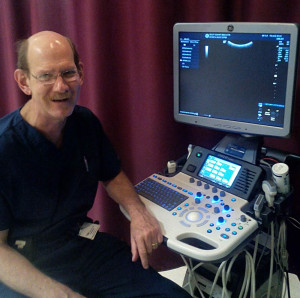
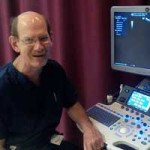 Tom Whelan, RDMS, RDCS, RVT, FASE
Tom Whelan, RDMS, RDCS, RVT, FASE